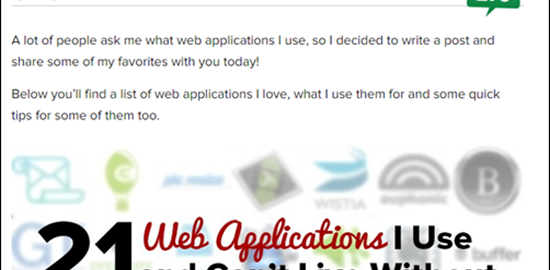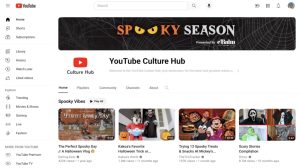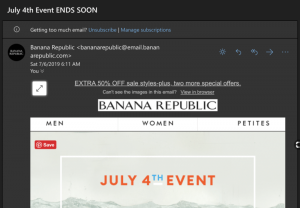Columnist Tom Demers discusses how successful content creators profit from success, failure, and everything in between.

You probably know more than you think. Not just about one thing – about all kinds of things.
I’m not a great poker player, but I was a “winning” poker player when I played at really low levels. I played a lot of poker, and while I didn’t lose money, I didn’t really make very much, either. I don’t play much poker anymore, and playing less was a good decision for me.
You wouldn’t want to learn poker from me, but I could write a really great post about how to know you should quit (or at least play less) poker based on how I made my decision, and why it was better that I did. I could interview people who are great at poker and try to understand why they chose to keep at it. I could point out similarities I found in those interviews.
When I said, “I’m not a great poker player,” you probably didn’t think, “I bet Tom could create a lot of great content about poker that would be valuable to a lot of people.” But, a blog about when to quit, when to power through, and how to know the difference would probably be pretty useful and interesting.
I’m not going to start a poker blog, but I say this to demonstrate that there are probably more ways for you to create useful, actionable content based on things you already know than you realize. In fact, sharing your personal knowledge about a topic — the specific things you do well, the processes you’ve used that have worked well, and the things you’ve tried that didn’t succeed, etc. — is a great way to attract the attention of thought leaders and prospects.
Some of the most successful content creators do exactly that consistently. In this post, I’ll show you the questions you can ask of yourself (or your business) to come up with great content ideas based on what you already know, and offer specific examples of successful content that people are creating for each question.
1. What Are You Doing (Or What Have You Done) That Works Well?
Sharing things you’re doing that are successful (and showing your work) is probably the most basic and consistently effective form of content marketing there is. It’s the basic principal behind all kinds of “before and after” marketing and content. You see this work in non-fiction books, infomercials, cooking shows, ads for diet products, etc.
Like many tactics you see positioned as “growth hacks” or new content marketing fads, this one has been around, in some incarnation, for years and years: I did X and got Y result.
The thing you’re probably underestimating is the expertise you have and the number of things at which you are successful. Here are a few “sub-questions” you can ask yourself to help brainstorm some great content based on your knowledge.
Sub-Question 1: What Tools Do You Use To Do Your Job More Efficiently Every Day?
You don’t even think about it, but the tools you use to do your job actually comprise a tested, honed, and useful list of products that other people trying to do the same job efficiently could really benefit from. Not only are you sharing with them the programs and services that you find valuable, you’re also implicitly telling them what tools you don’t need.
According to BuzzSumo, one of the most shared pieces of content on Search Engine Land is a piece by Matthew Barby called “37 Awesome Tools To Get The Most From Your SEO Campaigns.”

One of the most shared older posts on Pat Flynn’s popular site, The Smart Passive Income Blog, was a detailed post he wrote in 2013 about the web applications he uses everyday:

If you look back at BuzzSumo, you’ll see that Pat went back to that same well over a year later and wrote a post on the top ten mobile apps he uses everyday; and, he has already made sure to do an updated version for 2015. Both of those posts are among the top ten most shared on the site:

BONUS: You can even create a companion piece here along the lines of “How to Choose/Buy X,” which details the decision-making process you used to settle on the tool you use (possibly comparing several competing tools or just a framework to think about how to choose the right tool for you).
Sub-Question 2: What Makes You Money?
This one is pretty simple and (I hope) pretty intuitive: If you can share with people something that is making you money, that content has the potential to be pretty valuable for them.
- Lots of folks in the marketing industry do this with income reports – the aforementioned Pat Flynn was the first person I saw doing this. Others may have been doing this, too, but his income reports are so incredibly detailed and transparent that they add a ton of value (and are also some of his most shared posts).
- Matthew Woodward also has an income report of his own and a great regular feature where he rounds up other income reports from various niches. These round-up reports are a great collection of examples of folks creating great content by sharing what makes them money.
Not everyone wants to share this kind of information, but if you’re willing to share things like revenue, your salary (how to make X% more money as a {Your Profession}), or if you can get clients who are willing to share specific revenue numbers, you can create great content with a very tangible value and appeal to potential visitors.
Sub-Question 3: What Works For Attaining Desirable KPIs?
Many business owners know what they must do in order to succeed, but aren’t sure how precisely to do it. This is because achieving certain business objectives requires properly executing difficult and often nebulous tactics.
Since I’m in the online marketing industry, I’ll use the example of building links — but remember that this can apply to lots of different tactics in many different areas of life.
Building links and getting traffic is really hard, and most businesses are terrible at both. So sharing in-depth, specific case studies of how you got lots of media attention or even got a link from a single authoritative source can be extremely effective.

The links in that last sentence are to extremely popular YouMoz posts that Larry Kim wrote, which drove lots of traffic and valuable attention for his company, WordStream. Larry’s used this same tactic to create great content for Inc Magazine, Search Engine Land, and enough other places to become the most influential PPC marketer around.
When my business partner, Ken, was at WordStream, he wrote two similar posts that detailed step-by-step how we had gotten a link – first from the New York Times, then from CNN. Those assets drove a bunch of traffic and links, but note the titles that drew folks in: “How We Got a Link” — even just learning how to get a single link from a big publication was enough to get 20-50 comments and hundreds of shares to posts on a new blog written by a (then recently launched) start up.
Brian Dean from Backlinko does a great job creating these types of posts sharing the specific, step-by-step processes working for him (or other folks) on his blog, including:
- This post on “How a Brand New Blog Generated 17,584 Visitors In One Day”
- This post on adding an offer to a single blog post, and this one on applying that same CRO approach to several pages
- This case SEO / link building case study

Specific case studies that show what’s worked for you (along with a detailed, step-by-step breakdown of how you did it) are hugely valuable for readers and rarely fail to generate useful attention and shares for you.
2. What Have You Learned That Would Be Helpful To Others?
People like getting information from shared knowledge. The Today I Learned subreddit is extremely popular for this very reason, and the “What I Learned” format even makes for great book titles (and great books).
Neil Patel is really great at creating this kind of content for Quick Sprout – you can see tons of examples of him using this type of approach if you look for it.
Neil’s post on what spending $252,000 on conversion rate optimization taught him was shared hundreds of times and is a good example of the type of content you can create, even on subjects where you’ve hired someone else to do the work.
Things that you learned succeeding and failing at your core competency probably seem like obvious examples of this type of content, but if you get creative, you can find all kinds of different things that you do every day that you’ve probably taken important lessons away from that potential prospects would find interesting:
- What you learned from money you spent (like Neil’s post)
- What you learned from managing or hiring specific types of jobs (e.g., a mistake you made in hiring a developer, or something you did poorly when managing an intern or working with a copywriter)
- What you learned from working alongside a specific type of coworker (a personality type, specific role, even a specific person)
- What you learned about trying to keep a side job or start a business (even if they failed – more on failure in just a minute)
- What you learned by performing a specific job function over a period of time (e.g., What I Learned Writing 2 Blog Posts a Week for 2 Years)
- What it was like to have to fire people
Distilling a lot of time, effort and experience into a few key learnings is another extremely valuable resource for someone in your field.
3. What Mistakes Have You Made?
Like with sharing successes, sharing failures can create powerful content and can come in several different flavors, such as:
- Things you tried that haven’t worked
- Things you were wrong about
- Things that used to work but don’t anymore
One of the most shared posts on Noah Kagan’s popular OkDork blog is his explanation of how he lost a million dollars by being fired by Facebook.

That same topic actually headlines an interview with Noah which is one of the most shared posts on James Altucher’s also popular, also excellent blog. James himself also shares a lot of specific and general failures in order to create engaging, informative content in his own right.
Neil Patel shared a $43,500 mistake he made to once again drive hundreds of shares and create extremely interesting, useful content.
When you’ve stopped doing things, you can share that, too. In his post about the underlying B2B value of 4 previously successful SEO tactics (shared close to a thousand times), Derek Edmund does a great job outlining some of the things you can take away from tactics that previously worked well.
4. What Data Does Your Company Have That Could Be Valuable For Your Prospects?
What you know and what you’ve done aren’t the only ways to leverage existing, internal knowledge – your product or customer list may “know” things too.
Often, you can use your own data to get tons of traffic and lots of links. Industry studies and surveys are always linkable (and frequently interesting to the press assigned to your specific subject), but even just leveraging your own tool or data to do a deep dive on a specific topic can be extremely effective. For example:
- BuzzSumo wrote an incredibly in-depth guest post on OkDork detailing their analysis of 100 million articles taught them about why content goes viral, and it is one of the most shared articles on the site (according to BuzzSumo – meta, right?).
- CoSchedule then followed that up with their own OkDork guest post which even zeroed in a bit further and shared what they learned from analyzing one million headlines with their own data.
- WordStream used their own data to create an awesome infographic on the most expensive AdWords keywords, and it’s one of the most linked to pages on the site, according Open Site Explorer data
These content pieces all got tons of relevant links and shares. They also showed off the companies’ deep knowledge of their space.
5. What Do You Tell Your Customers And Clients Regularly That Helps Them Succeed?
If I need good content ideas, I’ll often look through my email to see if there’s anything interesting that a friend, colleague, or client has asked recently that would be generally interesting to other folks.
If you own or work in a business, that means people pay you money. If people pay you money, that means you’re doing something for them – solving some kind of problem, offering some kind of expertise.

LeadPages sells lead generation software and does a great job of taking some of the templates that work for clients and making those free. This is extremely useful and builds trust with the customer.
A popular podcast format is “Ask {X}” where entrepreneurs like Gary Vaynerchuk and Pat Flynn answer specific questions from viewers and listeners. This allows them to apply their expertise to interesting and specific problems in real time. If your expertise is particularly niche, you can control the questions you decide to answer in this type of format.
Pat Flynn also recently teamed with Chris Ducker to create a “1 Day Business Breakthrough” podcast, which takes a specific business and helps come up with ideas to solve a specific problem for them:

Similarly, if you’re a consultant without an audience that’s showering you with questions, creating a post that offers an example of your expertise can be extremely useful because you’re offering very specific tips on specific types of problems, and you’re also showcasing your expertise. Within the SEO niche, there are several good examples of “How I Would Do SEO for {Site}” posts, including:
- Tom Critchlow’s post on how he would do SEO for HipMunk
- Tom Harari’s extremely detailed breakdown of how he would do SEO for Rap Genius
- Steve Webb’s excellent analysis of Grantland.com
- Dan Sure had a couple of great examples of these in his posts on how he’d fix Whole Foods’ website and SEO tips for Nashoba Valley Winery
Some of these folks have established audiences, so you might not get the exact same kinds of numbers in terms of traffic, shares, and leads right away – but, as you can see from what’s outlined above these are the same kinds of tactics these folks are using to actually build their audiences.
So, what are you waiting for? You already know this stuff – just get writing!
Some opinions expressed in this article may be those of a guest author and not necessarily Marketing Land. Staff authors are listed here.
(Some images used under license from Shutterstock.com.)
Marketing Land – Internet Marketing News, Strategies & Tips
(362)
Report Post








